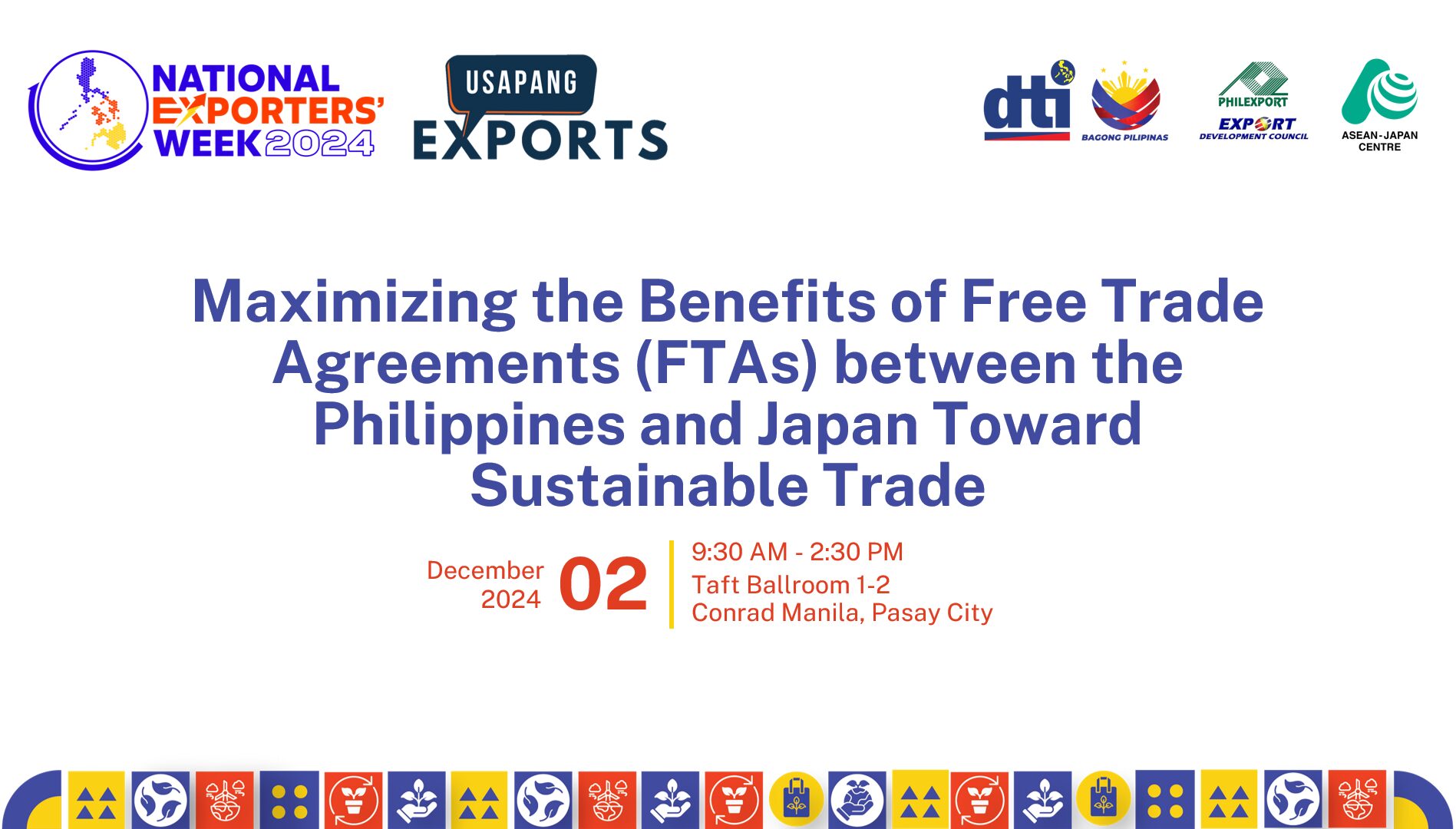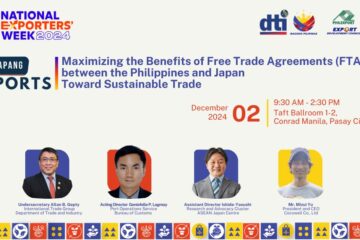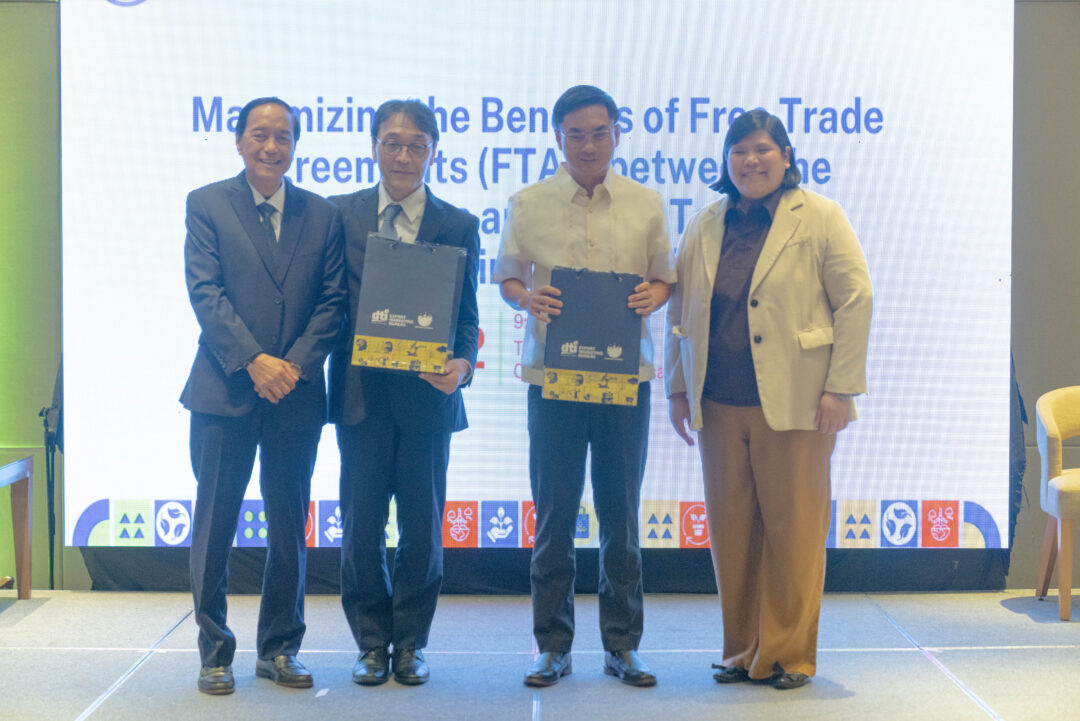
The Philippine Department of Trade and Industry (DTI), in collaboration with the ASEAN-Japan Centre (AJC), conducted the “Usapang Exports: Maximizing the Benefits of Free Trade Agreements (FTAs) between the Philippines and Japan Toward Sustainable Trade” seminar last December 2, 2024, 9:00-14:30 MNL time at Conrad Manila Hotel, Pasay City, Metro Manila, as part of the National Exporters’ Week 2024 networking event and festivities.
Key Takeaways
- Philippine Export Potential [DTI]: Philippines can position itself to become an innovative hub for sustainable manufacturing. The country can leverage its strong performance in the electronics and semiconductor sectors, which can be further supported through a review of trade agreements and rules to reinforce supply chains with Japan.
- State of Japan-Philippine Trade [BOC]: In 2022, Japan exported $11.4B to the Philippines, with key products including refined petroleum, integrated circuits, and machinery. Meanwhile, the Philippines exported $11.3B to Japan, primarily consisting of insulated wire, nickel mattes, and integrated circuits. Overall, top exports of the Philippines of Japan were electronics and semiconductors (over 50% of total exports to Japan); bananas, pineapples, and mangoes; tuna and other marine products; and nickel mattes and automotive parts and machinery.
- State of Japan-Philippine FTAs [AJC]: FTA utilization of Philippine exporters to Japan remains low–JPEPA (23.39%), AJCEP (1.18%), and RCEP (0.82%). Philippine businesses who wish to export to Japan are highly encouraged to make use of and maximize the benefits of the existing FTAs.
- Benefit of RCEP [METI]: Products imported from an RCEP member country, used as an intermediate good to produce a final product in another RCEP member country, will be regarded as originating from the RCEP member country that produced the final good. This provision could benefit electronics and semiconductor industries that source parts and raw materials from other countries.
- Three key components to maximize the benefits of FTAs [BOC]: Certificate of Origin, Rules of Origin compliance, and efficient Customs Procedures. Furthermore, local MSMEs are encouraged to utilize tools like Japan’s customs tariff finder and collaborate with DTI and BOC.
- Potential market opportunity [AJC and Cocowell]: MSMEs in the Philippines can target Japan’s health and wellness sector and services sector due to aging society and the growing number of lifestyle-related diseases. According to a recent “Consumer Trend Survey,” the proportion of “health-conscious” consumers increased from 28.7% in December 2008 to 43.2% in July 2024. In addition, the “organic food” market size in Japan amounted to JPY 153,142 million (PHP 39.9 billion) in 2022 and is expected to grow by 11.2% between 2024 and 2032!
- Accessing the Japanese market [AJC]: Aside from import quotas, labelling, and safety requirements, establishing relationships with Japanese agents and distributors is crucial for MSMEs. This can be achieved by participating in trade shows and industry events, joining business networks and associations, and actively engaging in social media.
- Cocowell’s Initiatives [Cocowell]: Emphasized social responsibility through the fair-trade premium Coco Fund. This Supports disaster relief (e.g., typhoon Yolanda in 2013, Leyte earthquake in 2017, Taal volcano eruption in 2020, and typhoon Odette in 2021), poverty reduction, and scholarships for underprivileged children in the Philippines.
About the Programme
The event kickstarted with the Usapang Exports seminar on maximizing the use of FTAs. The morning session of commenced with a welcome address by the DTI Undersecretary Ceferino S. Rodolfo, who underscored Japan’s pivotal role as a key trading partner and investor in the Philippines. Next, AJC Secretary General Kunihiko Hirabayashi emphasized the opportunities within Japan’s wellness market, encouraging Philippine MSMEs to explore this growing sector.
This was followed by a keynote presentation by, Undersecretary Allan B. Gepty , who stressed on the necessity of strengthening Philippine-Japan trade relations through value chain development in the electronics sector.
Mr. Makino Taro, Deputy Director of the Economic Partnership Division at the Ministry of Economy, Trade, and Industry (METI) of Japan, presented the benefits of leveraging the Regional Comprehensive Economic Partnership (RCEP) agreement to enhance trade between Japan and the Philippines.
Moreover, Philippines Bureau of Customs (BOC) Director Geniefelle Lagmay provided insights into the country’s key exports to Japan in 2022, which included electronics and semiconductors such as insulated wires and integrated circuits.
The morning session concluded with an open Q&A, where participants could ask questions directly to the keynote speakers.
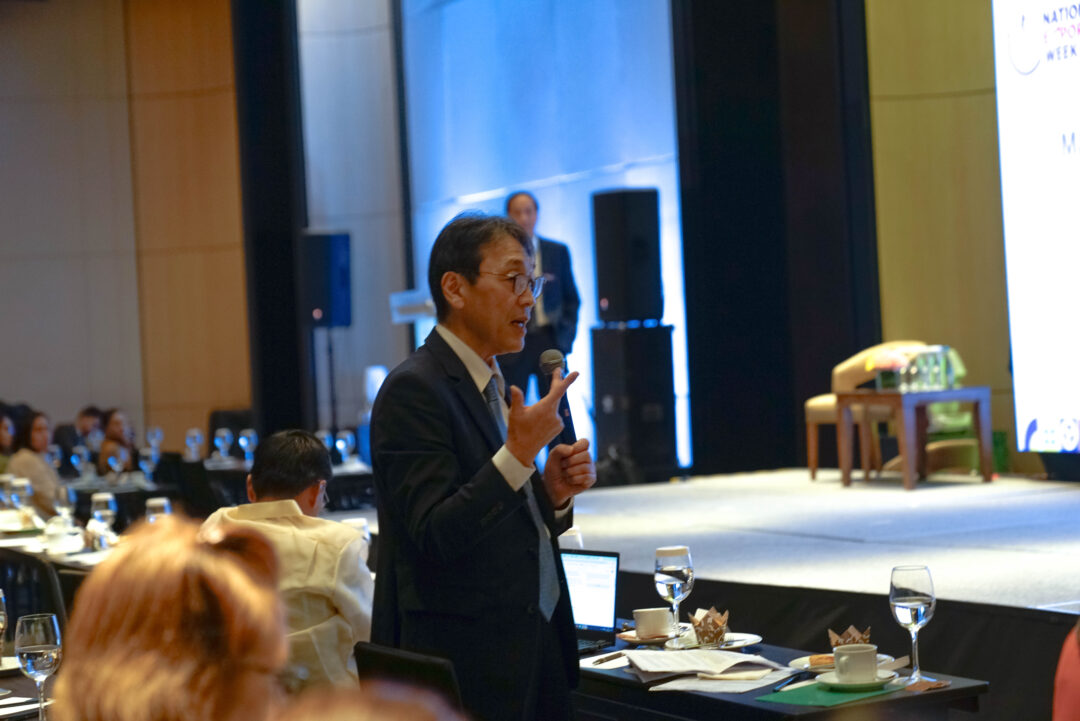
The afternoon session continued to offer valuable insights. Mr. Yasushi Ishida of the AJC delivered a comprehensive presentation on leveraging Philippine-Japan FTAs, exploring potential markets in Japan, and navigating Japanese regulations on foreign exports.
One of the day’s highlights was the keynote presentation by Mr. Yu Mizui, President and CEO of Cocowell, who shared the journey of his company as an MSME success story. The afternoon session also featured a panel discussion with Mr. Ishida, Mr. Mizui, and DTI Export Marketing Bureau (EMB) Director Bianca Pearl R. Sykimte. The panel addressed critical questions on FTA best practices, strategies, and challenges, highlighting the availability of promotional tools and programs. Additionally, they emphasized the role of sustainability in achieving market penetration in Japan.
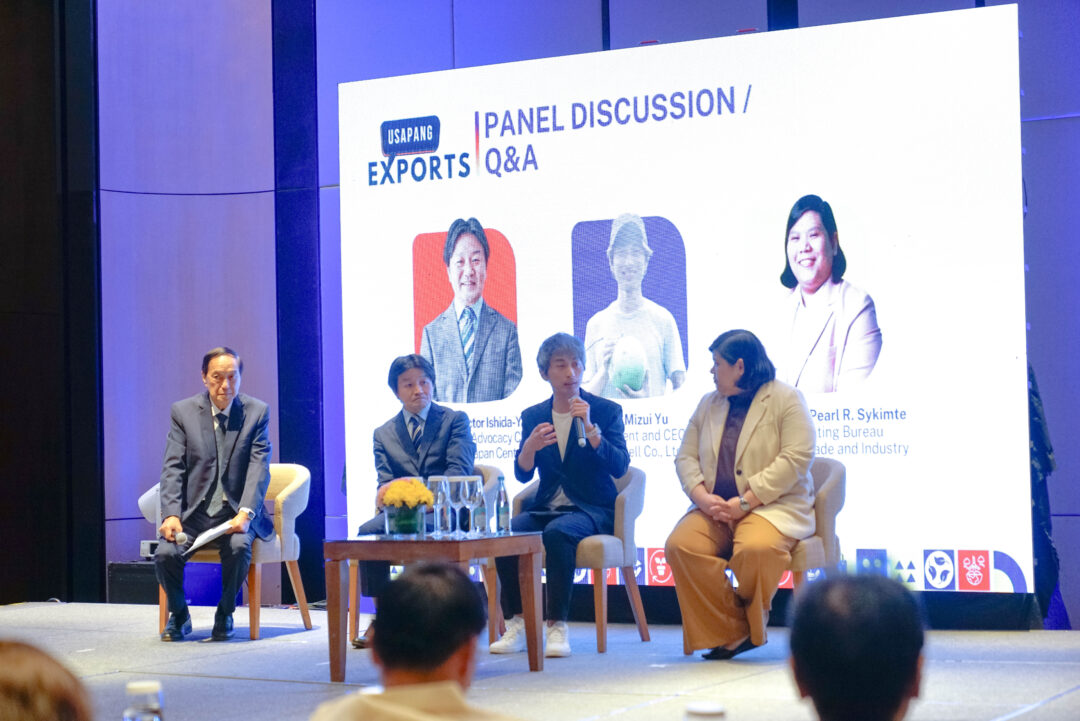
The event concluded with remarks from Director Sykimte, who expressed gratitude to participants and reiterated the importance of optimizing FTA benefits to further strengthen Philippine-Japan trade relations through sustainable and inclusive practices.


